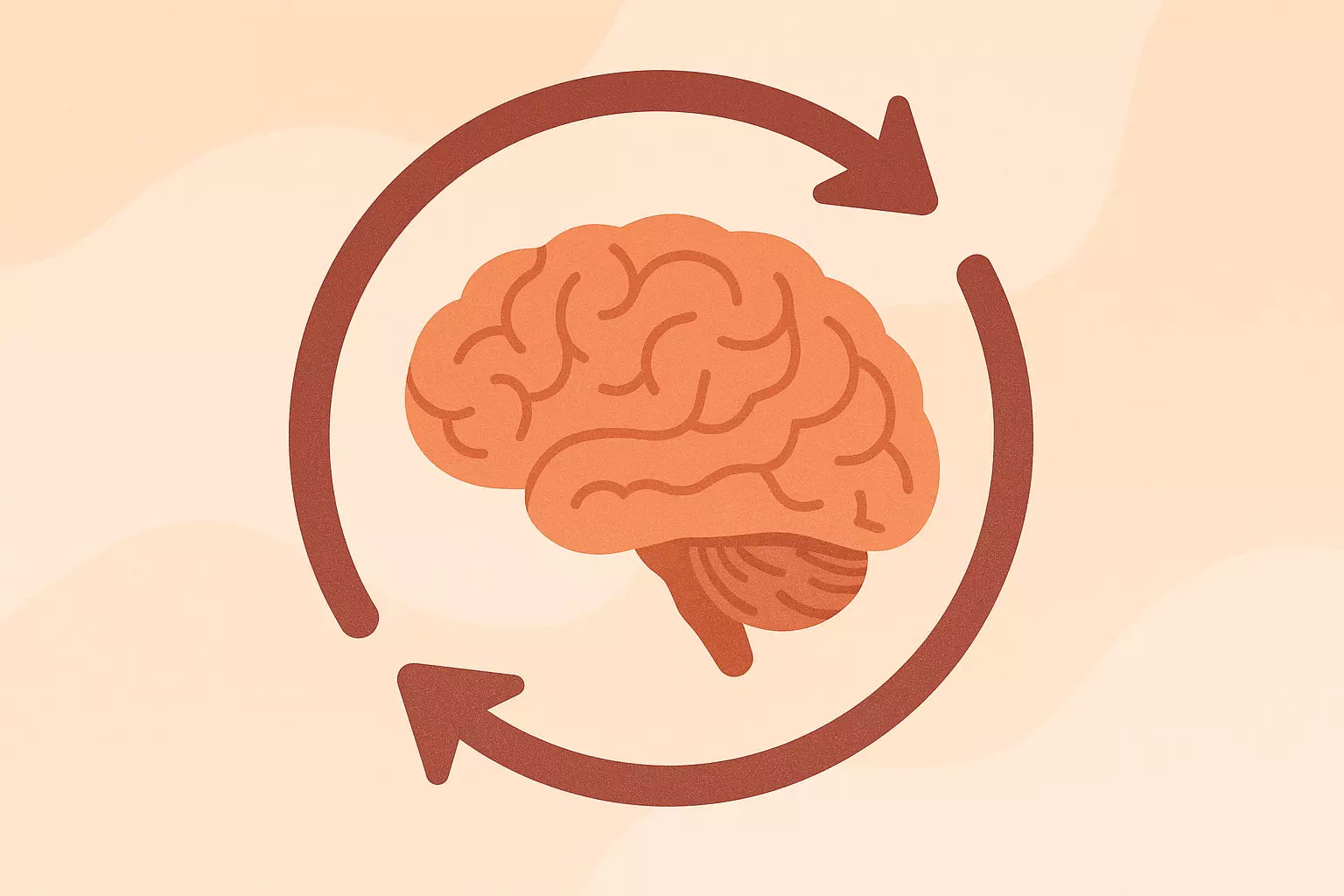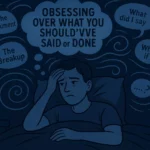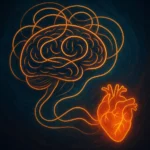Table of Contents
You know that feeling when your mind just won’t let go? You wake up, and before your eyes even open, their face is there. You try to work, but their laugh interrupts your train of thought. You try to sleep, and the memories stage a midnight film reel. It’s not just missing them—it’s like your brain has been hijacked and is stuck on one channel. This is breakup rumination, and it has a very real psychological explanation.
This isn’t weakness. It’s not obsession in the moral sense. It’s your mind, running a survival program it thinks is helping you. But the truth is, it’s keeping you in a loop that hurts. Let’s talk about why breakup rumination happens and why it can feel impossible to escape.
Why your brain won’t stop thinking about them
After a breakup, your brain treats the separation like a puzzle missing a piece. Psychologists call the mental replay rumination—a repetitive, involuntary thought process where you keep going over what happened, what could have been different, and what you’ve lost.
Mancone and colleagues (2025) found that higher breakup rumination after a relationship ended was directly linked to emotional distress, especially in people who used avoidance as a coping style. Avoidance creates unfinished emotional business—your mind keeps knocking on the same door, hoping this time someone will answer. Instead of finding resolution, you just keep deepening the groove of those thoughts.

When missing them fuels the loop
Rumination isn’t just about overthinking—it’s about longing. Research by Marshall et al. (2013), discussed in Siotia (2022), found a strong link between how much someone misses their ex and how much they ruminate.
- Thinking about them activates emotional attachment
- That attachment makes you miss them more
- Missing them pulls you back into thinking about them again
This is the essence of breakup rumination: a closed circuit that convinces you the only way to feel better is to keep mentally holding onto them—when in reality, it’s the holding on that’s keeping you stuck.

Why Breakups Hurt So Much (Science of Heartbreak & Healing)
Let’s examine breakups in: Biology of love & loss, Attachment styles, Rejection psychology, Closure, Rumination, Grief
Tap here to read more →Why some people loop more than others
Not everyone gets trapped in this 24/7 thought cycle to the same degree. One reason? Attachment style. Eisma et al. (2022) found that people with anxious attachment are far more likely to use ruminative coping after a breakup.
If you tend toward anxious attachment, separation triggers a primal alarm: Don’t let them go. Stay connected. Your brain interprets breakup rumination as a way to keep that connection alive, even if it’s only in your head. This makes the cycle stronger and the letting go harder.

Breaking the cycle
Breakup rumination is not a sign you’re broken—it’s a sign your brain is doing what it’s been trained to do: keep you safe from loss. The challenge is that, in this case, safety means staying in pain.
Recognizing the loop for what it is—a misdirected act of protection—can be the first step toward gently rewiring your mind to let go.
Sometimes healing isn’t about forcing yourself to “stop thinking about them,” but about slowly teaching your mind that you’re already safe without the constant replay.
FAQ
Q1. What is breakup rumination?
Breakup rumination is the repetitive and involuntary replaying of thoughts about your ex or the relationship. It happens when your brain treats the breakup like an unresolved problem, keeping you stuck in a mental loop that prolongs emotional pain.
Q2. Why can’t I stop thinking about my ex after a breakup?
You may be caught in a cycle where thinking about your ex fuels longing, and longing makes you think about them even more. This loop—called breakup rumination—is reinforced by emotional attachment and can be stronger in people with anxious attachment styles.
Q3. How long does breakup rumination usually last?
The length of breakup rumination varies from person to person, depending on factors like attachment style, coping strategies, and the emotional intensity of the relationship. Without intervention, it can last weeks, months, or even years, but understanding and addressing the loop can shorten recovery time.
Q4. How can I stop breakup rumination?
Breaking the cycle involves recognizing it as a normal but unhelpful mental pattern, practicing mindfulness to interrupt the thought loop, and replacing avoidance with healthy coping strategies. Addressing underlying attachment triggers can also make it easier to let go.
Scientific Sources
-
S Mancone et al. (2025): Emotional and cognitive responses to romantic breakups in adolescents and young adults
Key Finding: Higher rumination was associated with emotional distress, and maladaptive coping styles like avoidance significantly mediated adjustment outcomes.
Why Relevant: Directly links persistent breakup rumination to emotional distress and shows how it impairs recovery—perfect for explaining why thoughts loop endlessly.
https://www.ncbi.nlm.nih.gov/pmc/articles/PMC11985774/ -
Suchika Siotia (citing Marshall et al., 2013) (2022): Rumination and Missing the Relationship After a Romantic Breakup
Key Finding: Rumination scores correlated strongly (r = 0.61, p < .001) with measures of how much participants missed their ex.
Why Relevant: Demonstrates quantitatively how rumination fuels persistent longing and mental replays, capturing why you might think ’24/7′.
https://www.researchgate.net/publication/369546130_Rumination_And_Missing_the_Relationship_After_A_Romantic_Breakup -
MC Eisma et al. (2022): Desired attachment and breakup distress relate to ruminative coping
Key Finding: Individuals with anxious attachment styles used more ruminative coping after breakups, which hampered psychological adaptation.
Why Relevant: Offers insight into who is more prone to persistent obsessive thinking after a breakup, helping explain individual differences in thought looping.
https://www.sciencedirect.com/science/article/pii/S0005791621000781/
- Soothing the Spiral: Grounding Techniques for Breakup Rumination That Really Work

- Breakup Rumination Trap: Why You Stalk Their Socials (and How to Stop)

- Powerful CBT for Rumination: Break Free from Heartbreak Loops

- Breakup Rumination: Why You Can’t Stop Thinking About the Pain of the Past

- Breakup Rumination Hell: How to Escape the Pain Loop for Good

- Powerful Writing Therapy for Rumination: Find Peace After Heartbreak

- Breakup Rumination Relief: Powerful Ways to Interrupt the Thought Spiral

- Dopamine and Breakup Rumination: The Surprising Science Behind Why You Can’t Stop Thinking About Your Ex

- Breakup Rumination: The Powerful Truth About Why You Can’t Stop Thinking About Them


Leave a Reply